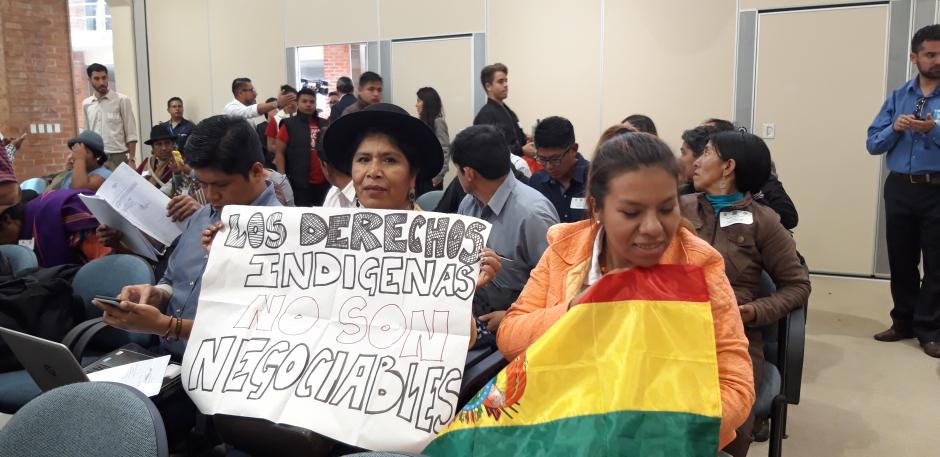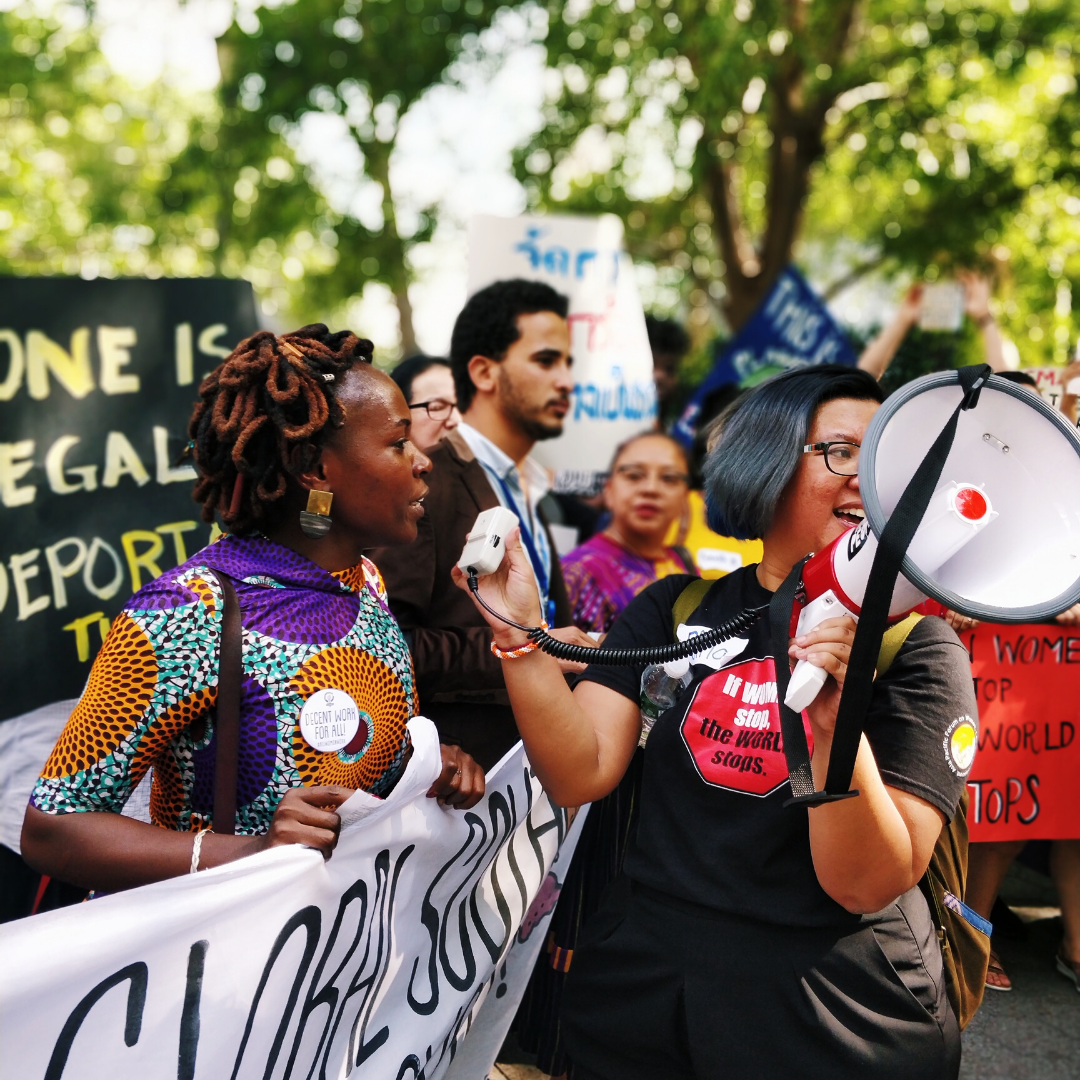The COVID-19 pandemic has exposed and intensified grave systemic injustices all over the world. People are being required to stay at home without secure housing, wash hands without access to clean water, and fill gaps in failing public healthcare and social systems with disproportionate impacts on women. Governments and corporations are imposing false choices, such as between contagion and starvation, hazardous work and unemployment, corporate bailouts and ruin, personal security and public health. As resisting communities, social movements, human rights organizations and defenders, we demand economic, social and political alternatives that make human rights and social justice a reality for all. A return to the status quo is not an option.
Communities in every part of the world have long resisted impoverishment despite abundance, increasing levels of inequality, undue corporate influence over public decision-making, and accelerating climate crisis and repression amid deepening authoritarianism. Our Common Charter for Collective Struggle – led by social movement members and endorsed by fellow members across 77 countries – articulated these common global conditions. The Charter ties these conditions to the dominant capitalist system—which prioritizes profits over people and the planet—intertwined structures of oppression, including patriarchy, racism and long histories of colonialism and imperialism. Building on the Charter, member discussions over the past several weeks concerning the pandemic have yielded analyses based on lived realities of people and communities around the world and demands on a range of issues, which provide the basis for this call to action.
Impoverishment, dispossession and inequalityhave worsened in the past few decades. Neoliberal policy reforms have weakened labor protections, increased extraction, facilitated capital to flow to wherever human rights and environmental protections are weakest, privatized and commodified basic necessities, undermined food sovereignty, built regressive tax systems and imposed austerity on the majority while providing subsidized prosperity for the elite few. These reforms have been imposed and manipulated for corporate and financial interests, including by the International Monetary Fund (IMF), World Bank and trade and investment agreements. Despite decades of so-called corporate social responsibility, corporations commit consistent abuses of workers’ rights and wider environmental and human rights, refuse to pay their fair share of taxes and continue to capture government institutions and public policy-making. The failure of governments to urgently address the climate crisis is perhaps the most glaring example of corporate capture. This has laid the groundwork for the pandemic to spiral into devastating public health, economic and social crises, as well as environmental deregulation.
The current focus on “saving the economy” instead of ensuring human rights and environment protection is an alarming echo of longstanding trends, including misguided approaches in response to the 2008 global financial crisis. Despite recognizing the severity crisis, the IMF and World Bank continue to largely operate as usual by offering emergency loans instead of meaningful debt cancellation and long overdue reparations for decades of policies that left people poorer and replaced colonialism with economic imperialism. Undue corporate influence has led to states providing massive corporate subsidies and bailouts with little oversight, rollbacks of environmental protections, and redefinitions of essential business to include mining operations and commercial construction companies, among others. Corporations have secured clearance for controversial projects, often amid repression of participatory rights of local communities and the right of Indigenous Peoples to free, prior and informed consent. When Indigenous Peoples exercise their recognized rights to self-determine their own economic, political and cultural models, they continue to face development aggression and criminalization.
Even as the pandemic has revealed what is truly essential work, those performing it continue to be systematically undervalued. In many countries, particularly in the Global South, most workers—including domestic and agricultural workers—are employed in the informal sector with no access to social security and employment insurance. Many workers are forced to work in increasingly precarious conditions, without adequate protective gear, paid sick leave and health insurance (in the absence of universal health care), or risk losing their jobs permanently. Women, migrant and minority workers in particular have experienced a disproportionate loss of jobs and livelihoods due to being heavily represented in the informal sector and precarious occupations. For some, the inability to work amid the closure of local markets, fishing bans, movement restrictions, and other social isolation measures threaten eviction, starvation, and impoverishment as many governments have failed to ensure public provision of necessities.
Inequalities within and between countries make many public health recommendations inherently discriminatory, as they require a certain standard of living such as access to clean water and sanitation and adequate housing. Furthermore, these recommendations often fail to take into account intersecting forms of discrimination present in society. Many groups with already limited access to adequate healthcare and other public services–including refugees, internally displaced people, LBGTQI communities, persons with disabilities, persons deprived of liberty, and sex workers–face greater obstacles amid the pandemic. In some contexts, evictions and displacement through house demolitions have continued in informal settlements and conflict-affected areas. In addition, digital solutions designed to ensure access to essential services, including education, medical advice and work opportunities disproportionately exclude groups with no internet connectivity and digital literacy.
Further, gaps in social protection systems have translated into intensified care burdens for women, who bear the brunt share of unrecognized and unpaid care work due to persistent gendered norms. This is worsened by increased incidents of domestic violence and challenges in seeking remedy due to restricted access to courts, as well as violence and harassment against women healthcare workers.
In addition, marginalized and impoverished communities are frequently located near polluting and extractive projects, leading to respiratory health issues that make them more vulnerable to COVID-19. This environmental injustice is heightened by narratives that celebrate temporarily improved air quality and reduction of emissions, upholding human versus environment paradigms that divert blame from our economic and political systems while ignoring the suffering of the impoverished, migrants and Indigenous Peoples.
Many governments are using the crisis to repress dissent and target already marginalized groups, including through emergency powers, anti-terrorist legislation, religious fundamentalism, increased surveillance and militarization. Human rights defenders have been attacked, as security strategies are undermined by strict shelter-in-place mandates. Multiple governments have targeted doctors, journalists, bloggers and HRDs who have reported on the pandemic. HRDs and political prisoners have often been excluded from prison releases that are inadequate regardless, with many trapped in pre-trial detention by the closure of courts. These threats are especially compounded in contexts of conflict and occupation, while being facilitated by arms manufacturers that continue to fuel violence. The rhetoric of ‘war’ in confronting the pandemic further intensifies the climate of fear and praise for authoritarian responses, thereby drastically limiting space for public scrutiny, participation and accountability. As states are marshaling unprecedented resources to address the crisis, there is a glaring lack of transparency and accountability around decision-making, exemplified by grave limitations to access to information in many countries. At the same time, they are using surveillance tools to gather personal data, often in breach of the rights to privacy and security and in close partnership with the growing technology sector.
This is the moment for long-needed systemic transformations, building a global struggle to make human rights and social justice a reality for all. Our Common Charter articulates a vision for systemic change focused on reclaiming human rights as a shared framework for analysis and demands, emerging from popular struggles for well-being, dignity, participation and substantive equality. This vision centers the experience, analysis and leadership of Indigenous Peoples, affected and resisting communities, organized workers and grassroots human rights defenders. Further, in confronting systemic injustices, the aim of reinventing the “normal” requires articulating and advancing inclusive alternative models. These have long existed among Indigenous Peoples, rooted in traditional knowledge, care networks, and recognition of the interconnection of all life. Other models of reciprocity, mutual aid and cooperation exist—often developed out of necessity—in many impoverished urban, peasant and fisherfolk communities and related social movements. Feminist movements have long advocated alternatives based on principles of equality, non-discrimination and respect for the people and the planet. While confronting immediate human rights violations, our demands necessarily address “the day after tomorrow” and insist on a future that prioritizes the rights of people and nature over profits, radically rethinking our economic, social, ecological and political relationships.
Our Demands
We call for COVID-19 responses to center human and environmental rights, in line with principles of universality, participation, transparency, substantive equality, and accountability. All such measures should be designed and implemented with the meaningful participation of affected communities and social movements and apply a feminist analysis in working to overcome overlapping, structural inequalities and inequities. States must utilize maximum available resources to carry out these measures and fully realize economic, social, cultural, and environmental rights for all people. Alternatives to the dominant status quo are viable and urgently needed.
Just responses require states and international bodies to respond immediately to the public health emergency (as outlined in our first three sets of demands below); adopt interim measures to ensure a just recovery and address the impacts of measures imposed to contain the pandemic; and take and support transformative actions that will lead us to a new normal:

